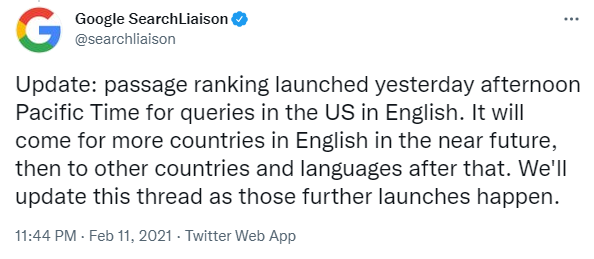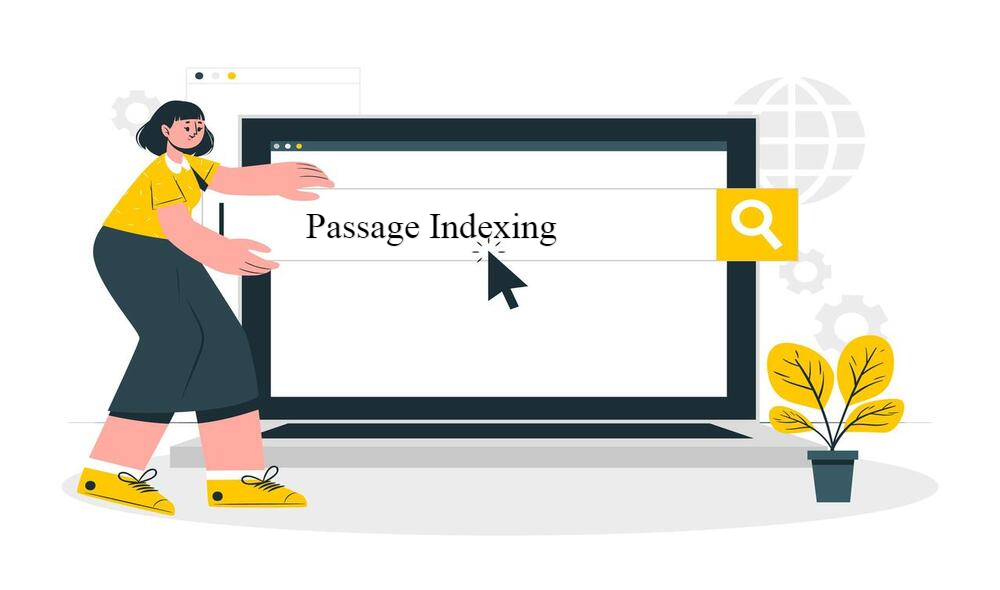Passage Indexing: Learn About Google New Algorithm

Since its inception, Google has been implementing various strategies to create better relevancy and context in the search results. The search engine giant often introduces new algorithm updates to support these strategies. Keeping up with these latest algorithm updates improves your search experience and helps you find the right information within a fraction of a second.
Google’s new algorithm update – Passage Indexing – helps the search engine understand the content better and deliver the best results to searchers. Google’s Public Liaison for Search, Danny Sullivan, tweeted on February 10th, 2021 – “Passage Indexing is live for English-language queries in the United States”.

What is Passage Indexing?
Passage Indexing is an automated feature used by Google’s Algorithm to rank individual sections of a word within a page on search results based on the user’s search query. Previously, Google used to rank the content solely based on the topic. With Passage Indexing, Google will highlight the sections of your content and rank them independently on the search result page.
The breakthrough algorithm update understands the relevancy of a specific passage from the entire piece of content and finds that needle-in-a-haystack information a searcher is looking for.
Passing indexing focuses on search engine ranking rather than displaying, almost like BERT or Link Analysis algorithm, without making much of a change in the overall standard look and experience of SERP.
How Does The Passage Indexing Algorithm Work?

Passage Indexing Algorithm doesn’t alter the crawling and indexing process completely but offers aid to Google in analyzing the meaning of the passage within the page without the need of indexing individual passages independently.
Earlier, Google lacked in delivering quick query responses to long-tailed question-based search, with having a list of websites mentioned as an end search results instead of specifying appropriate answers to the questions.
With the passage algorithm update, Google has fastened up the search result time by fetching the most contextually relevant answer for the users.
The passage indexing algorithm is the method of adding another layer to the existing indexing process that alters the search engine ranking pages according to the relevancy of the search result. The indexing algorithm is not a separate indexing process.
Passage indexing algorithms create a befitting impact on the ranking of specific passages and not on what pages Google generally indexes. It focuses on providing the best responses to its users from a wide range of legitimate sources. And it initiates a boost in long-form content to rank higher for more specific keywords. With this shift in the algorithm, Google focuses on what content can be useful for the users and eliminates misleading bots search results.
Before this breakthrough algorithm, establishments of pages with greater content were not optimized perfectly, as search engines were limited in providing keyword-based list information.
Passage indexing algorithms have changed the dynamics for long-tailed keywords that are now more vital than ever. Long-form content poses a better opportunity at ranking for more keywords.
That could mean sites with shorter content might take a small hit in ranking as the site with longer-form content gets a boost.
Difference Between Featured Snippet and Passage Indexing
A featured snippet is the kind of result that usually appears at the top of search result pages, it is the passage from the page that contains overall topic relevance. The featured snippet is used for voice search and it is known for using different systems than passages.
It is the result of a passage from a page that has overall topic relevance. However, passage indexing overlooks the pages’ entire relevance and considers only the relevance of the content from the search query.
As now we have a solid understanding of the passage indexing concept, moving ahead let’s get into the information on featured snippets and how they work.
Featured snippets appear from myriad web search listings that Google automated systems determine on what would make a relevant featured snippet to highlight for a specific search option. It commonly contains one listing, however, might exceed the limit on search results.
How Does Passage Indexing Affect SEO?
Passage Indexing is a small change in Google’s ranking system, nevertheless, it will bring visible differences in how Google will present search results to the users. Search engines were more focused on meta titles and heading tags as an essential element in analyzing the context of the content without paying heed to the passages of the content.

With passage indexing, Google has begun in determining the meaning of passages solely, as a result, uplifting ranking of individual passages for related search queries. Users can navigate exact passages even if the pages mention less relevant context to the user’s query, creating bigger implications on search engine optimization.
This also means search engine optimization might have to stop focusing on keywords and give more impetus on topic relevancy and conclusiveness.
Passing indexing will allow search engines to pay in-depth attention to user’s concerns and address them with pertinent content solutions. Brands will have to retain an interest in customers’ concerns by detecting and putting forward solutions that are comprehensive, factually correct, and appealing to valuable customers.
To gain more reviews to have an increase in search ranking list, ensure that websites perform well on mobile or handset devices. Mobile device users’ experience will be a vital strategy for SEO experts to focus on.
Keeping up with the passage indexing algorithm can keep search engine optimization strategists occupied for longer hours, as the focus will shift more on customer requirements and behaviors.
Final Words
Understanding competitors and utilization of various tools, platforms, and sources available to get relevant customers’ needs and wants. SEO strategists will have to come up with ways they can cover up every aspect and have the finest solutions to their target audience.
Post passage indexing algorithm age will have long-from and relevant content creators outranking competitors having short or irrelevant content. Building up search engine optimization scalability will be the key factor in increasing views and its Google search rank.
Index algorithms often use natural language processing features in indexing web pages and try to determine better the meaning of each passage of the content on the web page.

